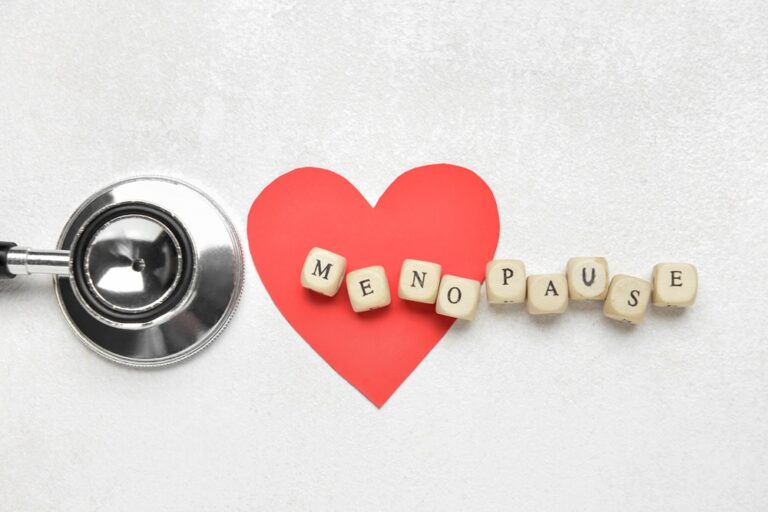Night sweats. Palpitations. Fatigue. Weight gain. These are just some of the most important changes
a woman experiences during menopause. There’s also a new hidden health risk for women in their 40s and 50s entering menopause: Women face a significantly increased risk of heart disease after the onset of menopause. The risk of cardiovascular disease is even higher for women who experience early menopause or
surgical menopause. What’s the connection?
Think about it. If you’re a menopausal woman experiencing night sweats, you’re probably not sleeping
Good. During the day your energy level is lower and you are less likely to exercise. Sleep deprivation and
Lack of exercise alone contributes to weight gain and other health problems that put you at higher risk
heart disease.
Menopause brings a double whammy:
- First, you don’t feel your best physically and as a result your eating and exercise habits change.
- In addition, the levels of two hormones, estrogen and progesterone, decrease. In particular, estrogen has cardioprotective benefits; it helps control cholesterol levels, keeps blood vessels healthy, and helps control fat buildup in blood vessels. When estrogen levels drop during menopause, a woman loses all of these heart-protective benefits.
The result: Heart disease factors increase during menopause, including increased abdominal fat, high blood pressure and increased cholesterol levels. The risk is also higher for overweight menopausal women who have other health problems, and there are different levels of risk between different racial/ethnic groups. Talking to your holistic healthcare provider is the best way to assess the level of the situation
your risk for heart disease is once you enter menopause.
Signs of early menopause
Premature menopause and early menopause are conditions in which a woman goes through menopause
at a younger age than usually expected. Menopause is not a process, rather it is a point in time when
menstruation ends.
- Early menopause is when menopause occurs before the age of 45.
- Premature menopause is when menopause occurs before the age of 40.
How do you know if you are experiencing early or premature menopause?
You may have an irregular menstrual cycle for a few years before your last period. Longer or shorter menstrual cycles, spotting between periods, or changes in vaginal bleeding are often some of the first signs of menopause. The other signs of premature and early menopause include many of the typical symptoms of menopause. You may experience:
- Hot flashes (sudden warmth spreading over your body).
- Night sweats.
- Vaginal dryness and discomfort during sex.
- Frequent urge to urinate.
- More frequent urinary tract infections (UTIs).
- Difficulty sleeping (insomnia).
- Emotional changes (irritability, mood swings, depression or anxiety).
- Dry skin, dry eyes or dry mouth.
- Sensitive breasts.
- Racing heart.
- Headache.
- Joint and muscle pain.
- Changes in your sex drive (libido).
- Difficulty concentrating or being more forgetful.
- Weight gain or weight loss.
- Hair loss or thinning.
If you start experiencing menopausal symptoms before age 45, your healthcare provider may intervene
perform various tests and ask questions to help diagnose premature or early menopause.
Increased risk of early and surgical menopause
Women who enter menopause before age 45 have a significantly higher risk of heart disease, even if they have no other risk factors, such as family history or being overweight. Women with early menopause are also at higher risk for heart failure, not just high blood pressure or cholesterol.
Surgical menopause is a unique situation that can unexpectedly lead a woman into this major life change. After a hysterectomy in which both ovaries are removed, a woman enters surgical menopause. This is a shock to the endocrine and reproductive systems, causing a rapid cascade of changes due to the fact that important organs involved in controlling estrogen levels are no longer present. The younger a woman is at which surgical menopause occurs, the greater her risk of developing heart disease.
Heart-protective self-care during menopause
For some women, especially those experiencing premature or surgical menopause, hormone replacement therapy is a problem
Replacement therapy (HRT) to replace lost estrogen can help. There are many factors involved when considering HRT; it is an important decision that a woman must make in collaboration with her healthcare provider. Even if HRT is a good option for you, it is critical for all menopausal women to practice heart-protective self-care for the body, mind, and spirit. Visit the Heart Health Center for tips on emotional well-being, stress management, exercise and healthy eating.

